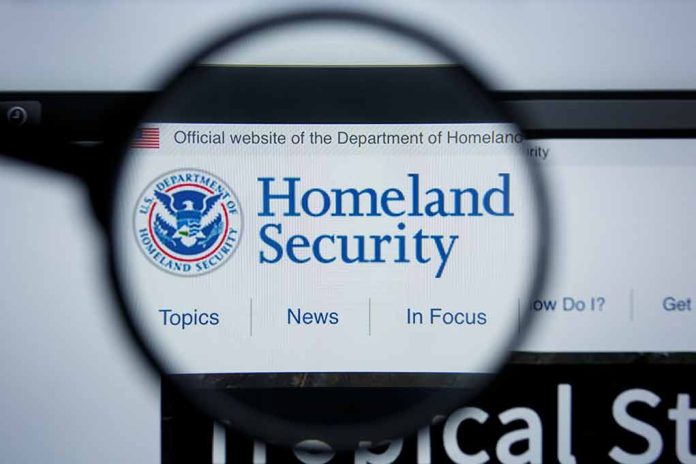
DHS Secretary Kristi Noem officially ends “Catch and Release,” authorizing ICE to arrest illegal immigrants at court hearings and implementing expedited removal for those who entered illegally within the past two years.
Key Takeaways
- Secretary Noem has reversed Biden-era immigration policies, ending “Catch and Release” and enforcing expedited removal provisions for illegal immigrants
- ICE agents are now arresting illegal immigrants at their court hearings, targeting those who entered the U.S. illegally within the last two years
- Expedited removal allows for quick deportation without a hearing before an immigration judge if there is no active, pending case
- The policy shift has led to protests and tensions in sanctuary cities like Phoenix, where progressive groups claim families are being separated
- The changes align with the Trump administration’s immigration enforcement priorities and the Laken Riley Act, which mandates detention for specific offenses
Noem Dismantles Biden’s “Catch and Release” Policy
The Department of Homeland Security has officially ended the controversial ‘Catch and Release’ policy under Secretary Kristi Noem’s leadership. This decisive action marks a return to stricter immigration enforcement after years of lax border control under the previous administration. DHS is now actively targeting individuals who entered the United States illegally within the last two years for expedited removal, a process that allows for swift deportation without the need for a lengthy court proceeding, provided there is no active immigration case pending.
“Secretary Noem is reversing Biden’s catch and release policy that allowed millions of unvetted illegal aliens to be let loose on American streets. This Administration is once again implementing the rule of law,” said a DHS statement to FOX.
The policy shift ensures that illegal immigrants with valid credible fear claims will continue through standard immigration proceedings. However, those without legitimate claims face immediate deportation, closing a loophole that previously allowed millions of unvetted individuals to disappear into American communities. This enforcement approach brings immigration policy back in alignment with the rule of law, addressing the national security concerns that arose during the open-border policies of recent years.
ICE Enforcement Actions Target Court Appearances
Immigration and Customs Enforcement (ICE) agents have been directed to arrest illegal immigrants at their court hearings, a strategic approach that leverages scheduled appearances to ensure enforcement actions. This tactic allows federal authorities to efficiently locate and detain individuals who entered the country illegally, rather than allowing them to remain in the United States while awaiting hearings that many ultimately fail to attend. The policy addresses the overwhelming backlog in immigration courts while ensuring that those without legal right to remain are promptly processed for deportation.
The enforcement actions have particularly impacted sanctuary cities like Phoenix, where local policies had previously limited cooperation with federal immigration authorities. These operations have generated significant controversy, with activist groups organizing demonstrations against what they perceive as harsh enforcement tactics. Progressive organizations have raised concerns about family separations resulting from these arrests, claiming that the operations are causing undue hardship to immigrant communities that had been protected under previous policies.
“We have seen over 20 families separated and rushed and funneled into vans, arrested in courtrooms, and shamed,” said Monica Sandshaper.
Legal Framework and Implications
The ‘Catch and Release’ policy has been described as a collection of policies, court precedents, executive actions and federal statutes spanning more than 20 years, cobbled together throughout Democratic and Republican administrations. The policy’s elimination represents a significant shift in how immigration laws are enforced, returning to the original intent of the Immigration and Nationality Act (INA), which provides discretionary authority for parole only in exceptional circumstances for humanitarian reasons or significant public benefit.
The current approach also aligns with the recently enacted Laken Riley Act, which mandates detention for undocumented immigrants accused of specific offenses and permits states to take legal action against the federal government for non-enforcement of immigration laws. This legislation strengthens the legal foundation for the administration’s enforcement priorities, though it creates potential conflicts with the Flores Settlement Agreement, which requires that minors in immigration custody be held in the least restrictive setting and released without unnecessary delay.
Legal experts anticipate challenges to aspects of the new enforcement regime, particularly regarding detention of minors and families. Courts have historically upheld Flores protections, creating an ongoing tension between strict enforcement goals and legal precedents. Despite these potential hurdles, the administration appears committed to prioritizing national security and border control, focusing on deterring illegal entry through consistent enforcement rather than the release-based approach that characterized previous policies.
Restoring Border Security and Rule of Law
Secretary Noem’s policy changes represent a comprehensive strategy to address what many Americans have viewed as an immigration crisis. By combining court-focused enforcement, expedited removal procedures, and detention for those entering illegally, DHS is implementing a deterrence-based approach intended to reduce the overwhelming flow of unauthorized border crossings. These measures directly counter the previous administration’s policies that critics argue incentivized illegal immigration through minimal consequences for unauthorized entry.
The implementation of these stricter policies has already begun to impact migration patterns, as potential migrants recognize that entering the United States illegally will likely result in detention and swift deportation rather than release into the country. This approach aligns with President Trump’s campaign promises to secure the border and protect American communities from the effects of uncontrolled immigration, including strain on public resources, increased competition for jobs, and public safety concerns related to inadequate vetting of entrants.
While progressive activists continue to oppose these enforcement actions, polling indicates strong public support for stricter immigration controls. Secretary Noem’s policy changes reflect the administration’s commitment to prioritizing the interests of American citizens and legal immigrants over those who circumvent lawful entry processes. As these policies continue to be implemented, DHS officials expect to see further reductions in illegal border crossings and a gradual restoration of order to an immigration system that had become overwhelmed by unprecedented numbers of unauthorized entrants.













